Top 10 Most Fascinating Facts About Lightning
I was originally gonna put "cool" or "shocking" facts about lightning, but I'm just one of those people who doesn't like to use irony or fall into lazy-ass puns. With that said, here are some incredible facts about lightning.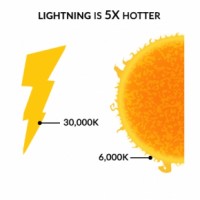
While temperatures of lightning bolts tend to have their own range, as does just about everything else on planet earth, the maximum temperature of a bolt of lightning is about 50,000 ° Fahrenheit, whereas the sun is roughly 5,000 ° Fahrenheit. Whenever a bolt of lightning strikes, and water is around, it heats up the area so, unless we're talking about a river or a larger body of water, water immediately gets vaporized.
That's shocking, because most people think of the sun as the "hottest thing in existence".
I actually knew it was hotter than the sun.

Okay, I know this contradicts lightning being hotter than the surface of the sun, but if you think about, that excessive heat is actually coming from the air that a bolt of lightning penetrates, therefore, the lightning bolt itself actually has no temperature whatsoever. Just technically speaking.
We often view lightning and thunder as two different things, but really they're just different parts of the same occurrence. To spell out what I'm trying to say, let's use an analogy: before cameras became part of cell phones, we had old fashion original cameras (think the early 2000s). When the flash went off, the camera took the picture. Lightning and thunder are the same. When lightning strikes, thunder booms.
That is interesting, but I have heard thunder when I didn't see the lightning, and also saw lightning at night when it was too far away to hear the thunder
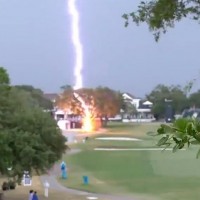
Although we often associate thunder and lightning with rain, lightning doesn't need rain. It will rain, but the temperature is set up so said rain will evaporate before hitting the ground. The most common place for dry lightning (or more professionally said, "dry thunderstorms") in the continental United States is the bay area, which is the number one reason that there are always forest fires in California.
I seen lightning without rain before and also heard thunder without rain
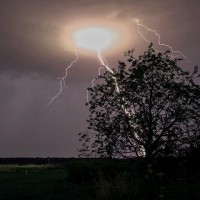
It's a misconception that metal attracts lightning. It's attracted to the tallest thing around, which is usually something that has a fair amount of metal on it. (Goalposts, skyscrapers, etc.) This is why people discourage standing in the middle of a field during a storm. You are the tallest thing around, so lightning will be attracted to you!
I thought it was attracted to metal, that is interesting that it is not
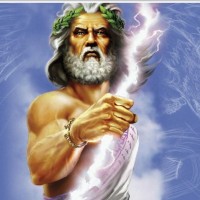
Mostly due mostly due to the fact that the Greek god Zeus's weapon is a bolt of lightning, and the power that a bolt of lightning has is god-like, powerful and throughout history and various cultures (Greek and Roman mythology, as well as Norse, and even Christianity,) have viewed lightning as a form of the ultimate punishment from the gods or even capital-G God.

I know it sounds like something from the book of Revelation, or some other apocalyptic series of events, but it's actually quite real. When a volcano erupts, debris goes flying into the air in a plume, colliding with lightning, making an electrical charge. In the same way as ordinary lightning, the imbalance of the plume's electrical charge and the charge in the atmosphere leads to lightning strikes, therefore creating volcanic lightning.

This is probably very obvious to most, but it's not just because a bolt of lightning can blow the roof right off of your house. If you are dumb enough to take a shower during a thunderstorm, if it's a good conductor of electricity, the shower head will probably attract lightning from a few miles away and when you touch it, you get zapped. This is equally applicable to sinks, dishwashers, washing machines and dryers.
I heard of it being dangerous to take a bath or shower during a thunderstorm incase lightning hits your house or something

There's a misconception that it's dangerous to touch someone who was struck by lightning, probably due to the assumption that you'll get zapped by them in some weird way. In fact, you might need to touch someone who was struck by lightning, if you ever find yourself in this situation, as CPR plays a large role in this individual's survival.
True I seen someone touch someone on rescue 911 when some guy got hit by lightning when he was about to take his dog for a walk during a thunderstorm, he probably should of waited until the thunderstorm was over, but he still survived he was lucky
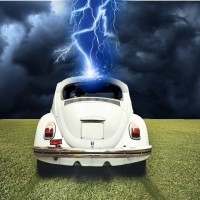
While a car can protect you from lightning, it's not because its tires can defuse the electricity. That is a lie. What protects you from lightning is how the metal roof, doors, trunk and the hood all direct the electricity from a bolt of lightning from you to everything surrounding you.